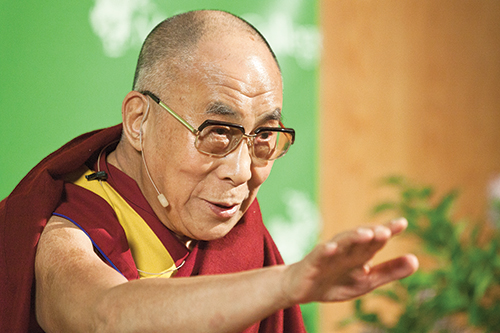“Looking at this tiny world from a distance in the galaxy…this is our only home,” the Dalai Lama said, gesturing eloquently with his hands.
Dalai Lama enlightens Portland with wise words

“Looking at this tiny world from a distance in the galaxy…this is our only home,” the Dalai Lama said, gesturing eloquently with his hands.
With humility and humor, His Holiness the 14th Dalai Lama, Tenzin Gyatso, spiritual and former political leader of the Tibetan people, addressed thousands of people gathered at the University of Portland’s Chiles Center. He spoke of the need to cultivate respect for others; genuine friendship across religious lines, he said, is the key to building the kind of cooperation needed to tackle environmental crises.
In a two-part event on Thursday called “Spirituality and the Environment,” the Dalai Lama sounded on themes of pluralism and harmony. It was the first public event of “The Dalai Lama Environmental Summit” held May 9–11 and was hosted by Maitripa College. The event was moderated by KGW anchor Laural Porter.
“We are all the same human beings,” the Dalai Lama said, calling on people to look past religious, racial and national barriers.
“This planet is a multireligious planet,” he continued. “We should not harm each other in the name of religion.”
Donning a Portland Pilots visor along with his maroon and saffron robes, the Nobel Peace Prize winner spoke of his lofty position with modesty.
“If I thought of myself as ‘His Holiness’ or as a different man from others, then there would be uneasiness [in my mind],” the Dalai Lama said.
In his opening remarks, he spoke of the shared values of forgiveness and peace across religious traditions. He compelled religious followers to practice with sincerity, not just preach, admitting that religious followers can often be hypocritical.
“All religions have a message of peace,” the Dalai Lama said. To actually live out ideals of peace, people must cultivate genuine harmony with one another, he said. The Dalai Lama added that an insistence on “only one truth,” or one right way of living, is contradictory to the ideals of pluralism.
“I am Buddhist…but I mustn’t develop an attachment to my religion…I can’t make everyone Buddhist…we have to live side by side,” he said, also addressing of the need to bring those unaffiliated with religion into the fold of cooperation.
“We must combine faith and reason” in fighting environmental problems, he stressed.
During the first part of the event, the Dalai Lama was joined by a panel of spiritual leaders from across the religious spectrum, who gathered to invoke common principles of cooperation and respect for other people and the planet.
As spiritual leaders offered their prayers and hopes for the environment, the respectful silence in the Chiles Center was palpable.
Grandmother Agnes Baker Pilgrim, a leader of the Confederated Tribes of Siletz, grew emotional as she spoke of the earth’s fragility.
“What the trees breathe, I breathe,” Pilgrim said.
Many panel members stressed the importance of respecting all life on earth.
“Each organism has a unique role to play,” said Imam Muhammed Najieb, the leader of the Muslim Community Center of Portland.
Rabbi Michael Cahana of Congregation Beth Israel agreed, saying, “All things have purpose of their own, outside of human beings.”
Panelists saw hope in changing attitudes.
“My generation didn’t think about the environment,” said Father William Beauchamp, the president of the University of Portland. “But today’s college-aged people are very aware.”
Environmental consciousness begins with tiny steps, the Dalai Lama said.
“My own silly contribution is to always [turn] off the light when leaving a room,” he said.
“It’s in everyone’s interest to take care of the environment,” he added. Environmental degradation hit close to home for the Buddhist spiritual leader. The effect of global warming on the Tibetan plateau is as extreme as it is at the north and south poles, he explained.
“Some people say Tibet is the roof of the world—very clean,” said the Dalai Lama, who was exiled from his homeland more than 50 years ago. “When I came to India, I was surprised that I could not drink water from the stream.”
During the second half of the event, the Dalai Lama delivered a lecture on global responsibility and the nature of the mind. He explained that the mind is the nexus between spirituality and science, stressing the malleability of the human brain.
“We all have the potential to develop our sense of compassion,” he said. The bonds that arise between a mother and child through affection, he said, can emanate toward global peace.
“[If you have] a strong belief in the oneness of human beings, then automatically [with that] comes a sense of global responsibility,” the Dalai Lama said.
Despite scientific advancements, the 20th century was one of bloodshed, the Dalai Lama said.
“We must believe that the 21st century can be a century of peace,” he said. “How? Through nonviolence. My interest is your interest.
“This must be century of dialogue, not century of weapon,” the Dalai Lama said. “Humanity, generally speaking, is really fed up [with] violence,” he said.
“Once you have a genuine care for other people’s well-being, there is no room for killing,” the Dalai Lama said. “Compassion…leaves no room for exploiting or bullying others.”
“We need to nurture basic human values through education,” he said. “That is how to build century of peace and understanding—through education, not prayer.”
The Dalai Lama injected humor into his talk. After veering off the subjects listed in the program description, he addressed his digression.
“Sometimes my talk and subject in program don’t go together,” he said to audience laughter.
Further reading
Dalai Lama inspires global action
His Holiness shared views on compassion and the environment
http://psuvanguard.com/news/dalai-lama-inspires-global-action/






Very nice article!